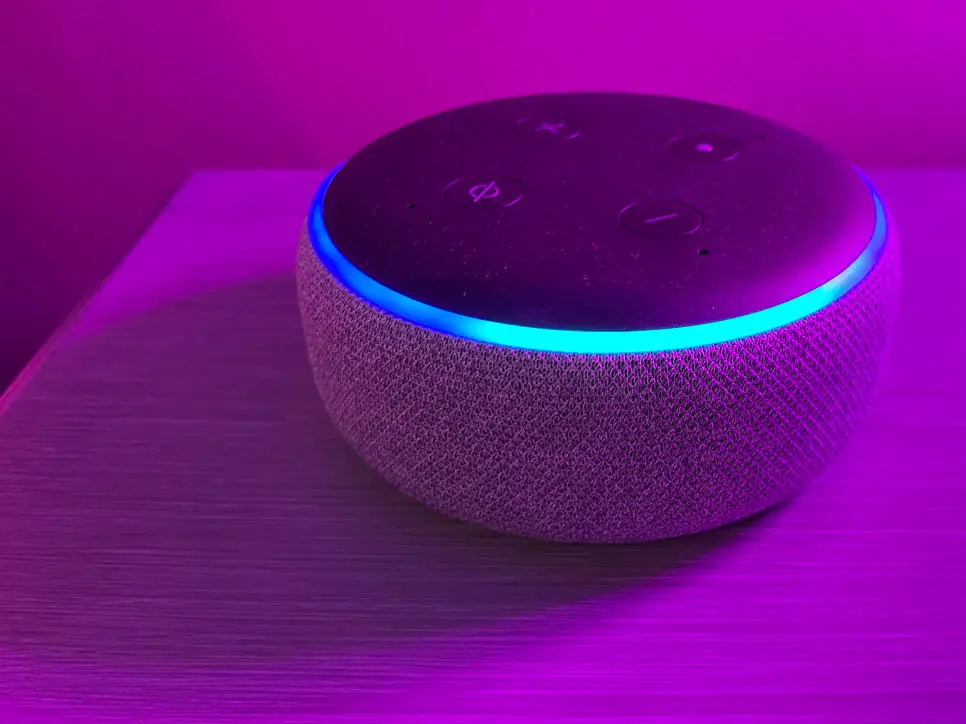Voice Search Is The New SEO Frontier
The use of voice search and smart speakers for SEO marketing is fast-becoming an opportunity for brands to target consumers in a new and convenient way at home. We are a leading SEO agency in Surrey and we believe this article will be a key subject to consider.
Command and be in demand – its the SEO of Content Marketing.
Voice Search is completely unique but it expands the potential for brands to connect with consumers in a way that is tailored to their verbal search behaviours.
With technology and analytics has come an ability for marketers to drill down into the data. They can create marketing strategies that are specifically designed for consumers and their needs.
It’s a smart SEO approach that generates results and with the smart speaker industry likely to quadruple by 2022, marketers are going to have even more scope to target more consumers.

What is Voice Search in Marketing?
Voice Search began in 2011 but was limited to Google Chrome. It wasn’t till 2014 that Google then made a 5 language rollout and by now most countries are included.
Nowadays adopting a voice search strategy could be one of the biggest things marketers could do at this moment in time. Why?
We have many choices of voice search with Siri on mobile and Ipad, Google Home, Amazon Alexa + Sonos Smart speakers. They are now extremely clever devices and are present ever more in the living room or also in bedrooms.
They allow marketers to create strategies that are tailored to each customer age group, helping to build relationships and brand loyalty.
With the likes of Alexa and Google Assistant both being able to differentiate between voices, they can deliver insight like never before. They have the ability to provide information about specific users and that means that personalised messages and content can be delivered at the right time.
Furthermore, brands can take a natural approach when it comes to interactions, and that seamless relationship aids retention and loyalty.
Voice search in marketing is also quicker and it provides convenience too, especially for those who are looking to do things quickly. What this means is that those brands that utilise it are more likely to deliver satisfaction.
Top brands have worked closely with smart devices to create intelligent appliances that can speak with customers, answer questions, and provide useful information at the same time.
Is Voice Search Being Used?
Absolutely. This new form of searching for things online is becoming a new norm for consumers because it’s simple and convenient.
Users no longer have to pick up their phone and input their queries by hand. They can now let their chosen smart device do it for them.
With 5G approaching, mobile use and voice will be used with greater frequency and higher consumer expectations. Businesses are now even deliberating over designing an App or Website to take advantage.
Research has found that around 48% of people are now using voice in order to carry out general web searches while 39% are now using smart speakers. That least study was taken back in July 2019, so you can assume 2020 was even greater (Lockdown!) and 2021 will continue to grow.
What Makes Voice
Search Important?
Google is constantly evolving to keep up with the ever-changing demands of users. As a result, voice technology is slowly becoming the face of SEO.
This is down to the fact that users are submitting queries that are no longer text searches. As a result, it means that businesses can now implement longer keyword phrases into their content.
Furthermore, voice searches are made mostly of full questions which means that brands can also use relevant question keyword phrases that mirror what they are asking.
What this means is that brands should consider adopting a voice search strategy if they do not want to get left behind.
It’s not just important for ensuring that customers can find your website but it’s also crucial in helping people choose your brand over your competitors.
If your competitors have a voice strategy and you don’t, then they have a higher chance of being found easily by searchers as a result of a more effective SEO strategy.
Voice search technology is still relatively new but it’s not going away any time soon and so, this is your chance to make sure you can get ahead of competitors.
Brands Embrace Voice Search With Smart Speakers
Brands now have an opportunity to embrace smart speakers and use them to enhance relationships, loyalty and sales.
Smart devices rely on skills and actions and that means that it can give customers the opportunity to tailor their purchasing experience to their needs.
Users are now turning to smart devices to take care of many elements of their lives and that can include asking for news, obtaining bank updates and setting reminders, it’s fair to say that they can carry out almost anything we ask of them.
This has meant that brands like Domino’s have been taking advantage of skills and actions that allow people to order pizzas without needing to pick up the phone.
This can be done in as little as 6 spoken words, after you download the Domino’s Skill. Here’s their YouTube video.
This goes further because even cleaning brands are now taking advantage of this technology. As a result, consumers can follow step by step instructions to help them remove stains.
Gaming brands such as Trivial Pursuit Tap from Hasbro, can be played on Alexa. With the addition of Echo buttons which light up for player interaction.
Brands are providing recipes, pollen counts and even information about dog breeds that can help people to purchase the right food for their dogs.
This is building brand affinity, a relationship and delivering a uniquely tailored experience.
Everyone is driven by convenience and control because that’s what consumers want and need.
Informational Voice
Search Queries
Users are seeking convenience and if they are not purchasing then they need information.
Brands such as Capital One are now making it possible for customers to keep on top of their credit card balance. Despite this, the process is slightly long-winded and as users still need to provide their sign-in details and a pin, it might seem more of a hindrance than a help for many.
This clearly highlights that perhaps the use of voice search isn’t yet the right fit for brands. Clearly, your thumbprint and face identity is still quicker via the credit card app on the phone.
As a result, brands are going to need to think more strategically when it comes to utilising voice search with skills and speakers.
Rather than give customers the ability to do things that they can already do, why not take an approach whereby they consider their needs and concerns.
This requires a wider approach that’s not so direct and more subtle. If a person asks Alexa “what is heartburn?”, which is a problem many people suffer from but it isn’t just a search that’s informational.
This is because the user might have a follow-up question that asks “how do I prevent it” and this is where brands can really take advantage.
Despite this, brands are going to need to own the right to operate at this level due to competition.
These informational voice search questions that are being asked are the perfect opportunity for brands to use smart speakers as an avenue for customer acquisition.
They can then build on this because it’s not just about using this as a way of offering a solution but also promoting other products. They can then begin to divert users towards products that are more valuable and trade up.
Who is the Consumer
Target for Voice?
Voice Search or Voice Control with smart speakers are now becoming mainstream at home. It’s a new technology that has become particularly popular with the younger generation using voice.
They can turn homes into smart homes, keep people connected and offer a vast amount of convenience – something that millennials, in particular, are looking for.
Furthermore, people are now using smart speakers to enrich their lives in ways that were once unknown.
They can create shopping lists, add previously bought items to their basket or just automatically order again.
Smart speakers also provide access to music streaming, once again, providing brands with an opportunity to build profiles based on their listening choices and the purchases that they are making.
It’s a generation that prefers to do things in an automated way instead of having to click through websites to make purchases.
Through targeted marketing, businesses can monitor their food choices, delve into their most cooked recipes and even identify interests. All of this data can be pulled together to create a detailed profile of almost every user.
So, although smart speakers are available for everyone, it could be fair to say that those who are possible under the age of 40 are more than likely going to explore the full functionality of them.
Don’t forget those 55+ or those even older who find it hard to type or even use a computer. Voice control could help bridge the digital canyon.
Voice Search SEO Tips
How can you be found on voice search? This begins by incorporating structured data using speakable markup, as almost 40% of voice search results will come from pages that have schema markup structured data.
Of course, many people carrying out voice searches are looking for local businesses so your Google My Business listing will need to be optimised. This involves making sure that all data is up-to-date. Do not underestimate this.
Google Mobile-First indexing and the number of “near me” searches are now making it extremely important to have a mobile-friendly website.
You need to make sure your website is mobile-friendly because voice search and a mobile-friendly website go hand in hand. Hand-held devices will be used more often for voice search especially now with 5G being introduced.
We detail in this article how to optimise your website which is very relevant for voice search, it will open in another window.
Finally, you will need to make sure that all of your content is optimised for voice search queries. The average length of a voice search is 29 words, so you should place a focus on long-tail keywords.
Use this SEO for Voice search combined with solid website optimisation practices + content and you will be competitive.
So, with all of this in mind, brands are now looking to target users in a new and immersive way. With the ability to tailor strategies on a personal level, it is undoubtedly shaping the future and the way in which brands and consumers connect.









